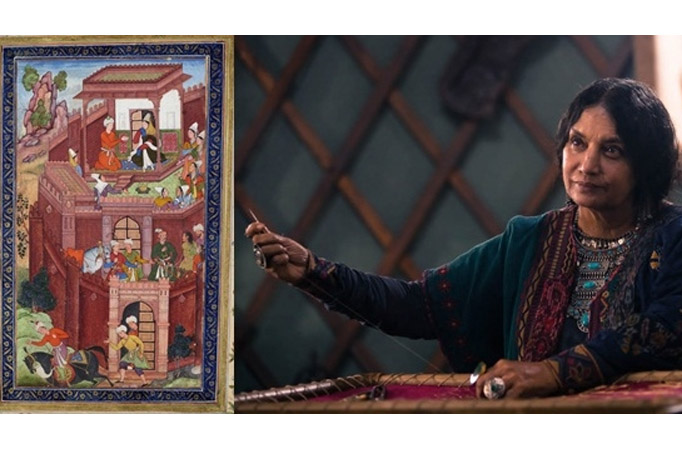
MUMBAI: In an illustration appearing in the manuscript of 'Babarnama', the first Mughal emperors account of his roller-coaster life, he is shown kneeling in front of his maternal grandmother, Aisan Daulat Begum, and seeking her advice while he was still a teenaged prince on the run from the Uzbeks.
That the manuscript was illustrated in the 1590s, at the time of Babar's grandson, Emperor Akbar, is indicative of the matriarch's special place in the history of the Timurids (or the Mughals, as they came to be known later).
As time went by, Aisan Daulat Begum was forgotten till she was resurrected by the English husband-wife duo of Diane and Michael Preston, better known by their joint pen name Alex Rutherford, in the first volume of their six-part series, 'Empire of the Moghul'.
Babur's grandmother is back in the news -- this time, because Shabana Azmi is playing her in Nikkhil Advani's Disney+Hotstar series, 'The Empire', which starts streaming on August 27.
The series has put the spotlight on royal women at the time of the Mughals. Indian American professor Ruby Lal took a deep dive into the subject in her book, 'Domesticity and Power in the Early Mughal World' (2005), but it was Ellison Banks Findly, retired Distinguished Professor of Religion of Trinity College, Hartford, Connecticut (USA), who first brought their power to the notice of the world with her 1993 book, 'Nur Jahan: Empress of Mughal India'.
Nur Jahan gets much attention, according to Rana Safvi, historian of Delhi and author of 'City of My Heart', because she was officially the co-ruler of Emperor Jahangir. She appears in Alex Rutherford's fourth book, 'The Tainted Throne', and is the subject of Ruby Lal's 'Empress: The Astonishing Reign of Nur Jahan' (2018). She was also the only Mughal empress to have coins struck in her name and hold court during Jahangir's frequent alcohol-induced bouts of illness.
But, as Safvi points out, Mughal royal women were independent and entrepreneurial. The only exception was Mumtaz Mahal, Nur Jahan's niece and Shah Jahan's wife, who, as Swapna Liddle, author of 'Chandni Chowk: The Mughal City of Old Delhi', had little time to do anything other than motherhood, having given birth to 14 children (she died because of complications when the 14th was born).
The first of the remarkable Mughal women was Gulbadan Begum, Babar's daughter, author of 'Humayun Nama' and the subject of Lal's forthcoming book. Her account of her half-brother Humayun's life is an invaluable source for historians who wish to know more about his fratricidal war with his brother, Kamran Mirza, and about the as social life of the ruling elite.
That Gulbadan Begum was much loved and powerful is evident from the many laudatory references to her in Abul Fazal's hagiographic 'Akbar Nama'. Akbar, in fact, supported her Haj pilgrimage, which was then unheard-of for a woman. Gulbadan Begum's presence in Mecca caused a stir in the contemporary Arab world, but she spent three years and half in the holy land before returning home.
Akbar's wife, Jahangir's mother and daughter of Raja Bharmal of Amber, Jodha Bai of historical fiction, who was honoured with the royal title, Mariam-us Zamani, was an entrepreneur who, as the historian Manu Pillai reminds us, owned the largest Indian merchant ship, Rahimi, trading in the Red Sea.
When the Portuguese, who controlled port of Surat and Daman, besides Goa, seized and burnt the Rahimi in 1613, Jahangir took immediate punitive action. He laid a siege on Daman and blocking Portuguese access to Surat. The Portuguese attempt to win back the emperor's favour with a hefty compensation did not help.
Till then, they had managed to keep the English at bay, according to Pillai (who quotes Findly), but the Rahimi incident ensured they were out of favour and the doors opened for Sir Thomas Roe, the English ambassador in the Mughal court who could be credited for laying the foundation of British rule in India.
(Tomorrow: Part II: From the sister Jahanara and Roshanara to the tragic Zeb-un Nissa and the all-powerful Qudsia Begum)
SOURCE : IANS

















Add new comment